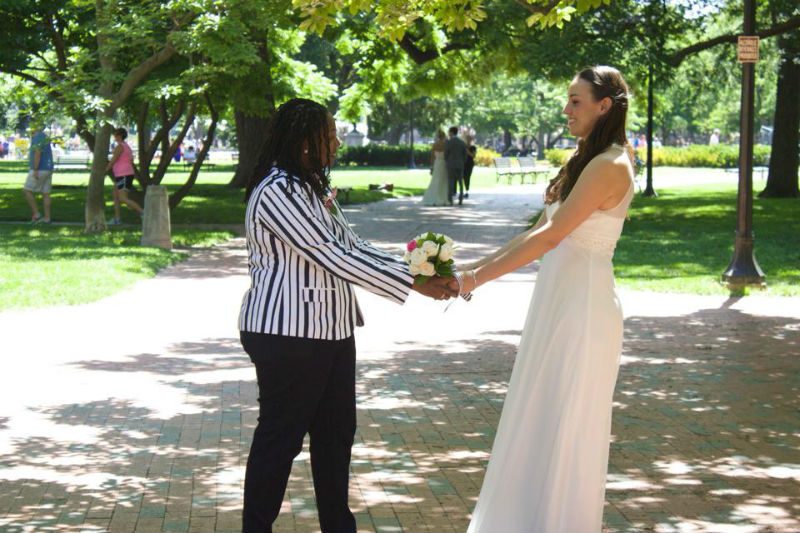The ongoing adventures of an interracial lesbian couple.
By our third date, we were already toying with the names of our make-believe babies. We jokingly bounced around names like “Shakenzie,” “Kenzia-Amber” and “Shaquenzanae,” meshes of her Nebraskan and my Southern name and background, before finally agreeing to start an actual list of meaningful names, like Zora, Keaton, and Orville … maybe Orville.
Following the standard lesbian U-Haul formula, we moved in and were engaged within three months. For the most part, her family was excited. Her father shared some objections, but her mother and brother were excited and supportive from the start. Much of my family, however, turned a biblical blind eye.
Mention of the marriage garnered an uncomfortable silence. Messages, inquiries, and invites went unanswered. I’d anticipated their response since forever, so I never even allowed myself to imagine having a wedding ceremony with family and friends.
When Kenzie and I began discussing marriage, I initially fought for a quick stop by the courthouse to spare myself the hurt of the “groom’s” seating section of the chapel empty. However, when I saw Kenzie’s (and her mother’s) excitement to walk down the aisle in a white dress, I knew that I couldn’t let my own insecurities rob my then-fiancé of that moment.
In the midst of it all, I received a grant to research in Belize for the summer, set to take place during the same time we’d planned our ceremony. As we began discussing whether we should wait until I returned, or squeeze the wedding in before my departure, I came across an article about Paul Hard, an unfortunate gay widower who had been battling his intolerant mother-in-law over his deceased husband’s final wishes for years. 

I knew Paul because was a professor and the advisor of the gay-straight alliance on campus during my graduate studies. He’d welcomed us—approximately a dozen open-minded misfits—into his own home for GSA meetings. The bond between Paul and his husband, Charles Fancher, was undeniable and inspirational.
They’d eloped to Massachusetts because their union was still not possible in the state where they lived, worked, and paid taxes for years, Alabama. Even after legally marrying and sharing a home, Charles’ mother chose to ignore her son’s wishes and fought with all her might to disenfranchise and belittle Paul and Charles’ love. Their marriage license, although disputable in the South, gave Paul a fighting chance.
We too chose to have that chance. Within weeks, we planned and put on a beautiful ceremony in the area of Dupont Circle in Washington D.C. Several of Kenzie’s family members and loved ones made the trip, while I was accompanied by a single sister and my three best friends.
On the morning of our wedding, my mother called to say that she loved me unconditionally, but could not stand against her beliefs. I had to understand. Nonetheless, it was a beautiful and breathtaking occasion … literally. When I finally saw Kenzie in her flowing white wedding gown, I honestly had to remind myself to breathe and blink. Kenzie’s brother, decked in full United States Air Force attire, walked both of us down the short aisle of the chapel. We all laughed and cried throughout the brief ceremony before it was finally made official.
“I now pronounce you Mrs. And Mrs. Kenzie and Kia McCall-Barnes. You may kiss the bride.” This was real! As I looked around at the crying faces of our loved ones, I knew that the tears shed were tears of joy.
I felt no hurt or shame. I knew that we were surrounded by people who loved and supported us, and I knew that Kenzie was happy. At that moment, I realized that it was time to let go of the previous decade of secrecy and shame. I had a new life and wife. What else could possibly matter?
To be continued…
